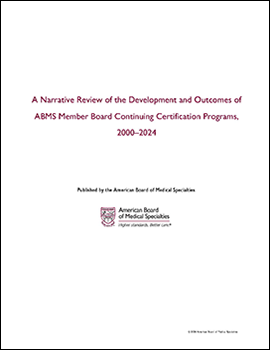ABMS Board Certification:
Serving the Public and the Profession
Since 1933, the American Board of Medical Specialties (ABMS) has served the public and the medical profession by offering a trusted board certification credential — the gold standard for recognizing the competence and professionalism of physicians and medical specialists.
ABMS sets standards for board certification to ensure a program is both relevant to, and supportive of, a physician and medical specialist’s learning and improvement needs. These standards also offer patients a reliable means of verifying that physicians and medical specialists continuously demonstrate the knowledge, skills, judgment, and professionalism that define high quality medical specialty care.
Just as medical science advances, ABMS has adapted its standards to drive changes and improvements to its Member Boards’ certification programs. These enhancements, developed in collaboration with physicians and medical specialists, state and specialty societies, patients, and other public stakeholders from across the health care spectrum, are guided by research that supports the value and impact of board certification on quality health care.
ABMS board certification has developed over many decades, and its continued evolution will remain transparent, collaborative, and forward-facing — focused on how it can best support the profession and improve patient care today and tomorrow.
Nearly one million physicians and medical specialists hold an active board certification from an ABMS Member Board.
✔ Evaluating Physician Certification Programs
ABMS recognizes and appreciates that it is not the only specialty medicine certification program available and is supportive of certification programs that align with the guidance established by the Institute of Credentialing Excellence (I.C.E.) and American Medical Association (AMA). Exceeding the baseline definition of a certification program allows ABMS to provide a certificate that physicians and medical specialists desire, patients rely upon, and hospitals, health systems, credentialers, and insurers independently use to inform decisions.
I.C.E. defines a certification program as being “designed to test the knowledge, skills, and abilities required to perform a particular job, and, upon successfully passing a certification exam, to represent a declaration of a particular individual’s professional competence.”
AMA policy states “that when the equivalency of board certification must be determined, the certification program must first meet accepted standards for certification that include both a process for defining specialty-specific standards for knowledge and skills and offer an independent, external assessment of knowledge and skills for both initial certification and recertification or continuous certification in the medical specialty.”
- Evaluating the Legitimacy of a Board Certification Program[PDF]
- Report 4 of the AMA Council on Medical Education (Interim 2023) Recognizing Specialty Certifications for Physicians (Resolution 316-1-22)[PDF] – See page 10 for Table 1. Comparison of Credentialing Organizations
- AMA Council on Medical Education CME Report 2-I-23 “Update on Continuing Board Certification”[PDF]
- National Defense Authorization Act Recognizes ABMS Member Boards in New Legislation Defining Physician Certification Organizations
- ABMS Member Board Certification: A Trusted Credential[PDF]
- ABMS Letter to Hospital CMOs
- ABMS Helps Hospitals and Health Systems[PDF]
✔ Relevant and Meaningful Continuing Certification Standards
In 2018, ABMS convened the independent Continuing Board Certification: Vision for the Future Commission (Vision Commission). The Vision Commission, composed of diverse public and professional constituents, gathered feedback broadly from external stakeholders including professional and state medical societies, practicing physicians and medical specialists, ABMS Member Boards, patients, health care advocates, and credentialers, and made recommendations about how Continuing Certification could bring more value to the public and the profession.
ABMS’ new Continuing Certification Standards were developed following recommendations from the Vision Commission through a highly collaborative and transparent process that included a review of thousands of public comments received from individuals and organizations. Inclusive and transparent by design, nearly 100 volunteers representing important stakeholders from across the health care community, and offering myriad perspectives contributed to the development of the Continuing Certification Standards.
ABMS Member Boards’ continuing certification programs assess knowledge while helping physicians and medical specialists stay current in their specialty; support professionalism; and encourage engagement in improving the quality, value, and safety of health and health care in the systems in which they work. These certification programs provide hospitals, health systems, patients, and communities with a credential they can independently and voluntarily rely and depend on when arriving at their own personnel or operational decisions. Feedback from those participating in these programs indicates support for changes made to the Member Boards’ knowledge assessments through these new Continuing Certification Standards.
- JAMA: Vision for the Future of Continuing Board Certification
- JAMA: ABMS and New Standards for Continuing Certification
✔ A Program Supported by Research
Substantial evidence demonstrates the positive association between ABMS Member Board certification and patient safety, health care costs, disciplinary actions, and clinical outcomes. Recent examples include the following:
- A Narrative Review of the Development and Outcomes of ABMS Member Board Continuing Certification Programs, 2000–2024
- ABMS Member Boards’ Formative Assessments Support Learning
- Fortune* commentary “Why It’s So Important to Find a Board Certified Doctor”
*Fortune requires readers pay and/or subscribe to access articles. - Read more articles in the Continuing Certification Reference Center
✔ Incorporating the Public Perspective
ABMS has consistently sought and incorporated public perspectives into its leadership, programming, and decision-making processes while supporting the ABMS Member Boards in their efforts. This includes dedicated seats for Public Members on the ABMS Board of Directors and numerous committees, to the establishment of the ABMS Stakeholder Council, to expanded public comment periods for key initiatives.
- From Outsider to Insider: My Time on the ABMS BOD as a Public Member
- Continuing Board Certification: Vision for the Future Initiative Selects Commission Members
- ABMS Has Long Legacy of Public Members
- Public Members Help ABMS Member Boards Fulfill Their Mission
- ABMS Member Boards Solicit Public Input in Myriad Ways
- Public Voices Help ABMS Live Its Mission[PDF]

